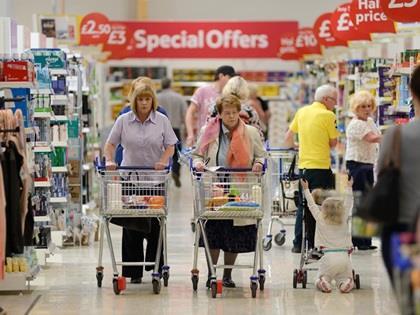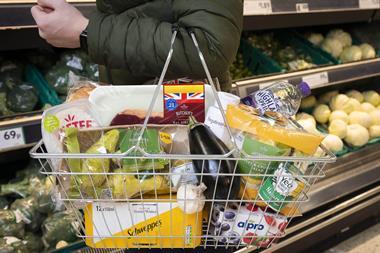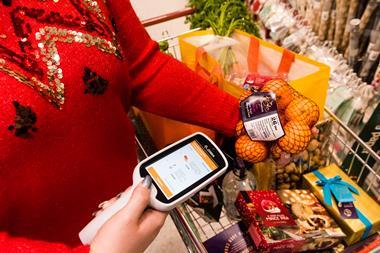
Top story
Supermarket sales grew 7.6% in November, driven by soaring inflation which mitigated a 4.3% in volumes as shoppers cut back amid cost of living pressures.
According to the latest market share figures from NielsenIQ, total till sales grew 7.6% in the last four weeks ending 3rd December 2022, up from 5.3% recorded last month.
Growth was a result of double-digit food inflation, as UK shoppers remain cautious regarding the contents of their shopping baskets.
According to NielsenIQ data, in the last four weeks, shoppers have focussed on core grocery essentials as they are mindful of discretionary Christmas spend. This has led to a lift in value growth for categories such as dairy (13.9%), pet food (12.5%), frozen food (11.9%), soft drinks (10%) and packaged grocery (9.2%).
Beer, wines and spirits, which is a key category to drive value sales at this time of the year saw both value declines, down 1.5% and 3.6% respectively. This may be attributed to overlaps in terms of trade challenges and the beginning of Omicron reported in the UK, Nielsen said.
In terms of retailer performance over the last 12 weeks, discounters gained momentum, with Lidl sales up 12.9% and Aldi up 12.4.
The Cooperative (up 8.8%) benefited from consumers managing budgets by shopping locally, Meanwhile, sales were stronger at Iceland (up 7.6%), likely helped by consumer trends in purchasing frozen food, as households cope with rising energy, travel and food prices.
Of the mults, Asda posted the strongest growth of 7.7% with Sainsbury’s and Tesco up 6.6% and 6.5% respectively.
Morrisons was down 3.3%, the only retailer other than Waitrose (down 1.5%) in decline.
Online sales fell 1.3% and the online share of FMCG spend remained at 11.3%, down from 12.3% this time last year. In contrast, there was strong growth in brick and mortar, with sales up 9.3% and visits to stores up 7.4%. Nielsen said it appears that shoppers are hunting for the best value and are much less reliant on online shopping than in the previous two years.
Mike Watkins, NielsenIQ’s UK head of retailer and business Insight, said: “With double digit food inflation, shoppers will be spending more to buy less this Christmas but there are now a number of new coping strategies to help meet increased costs. These include wasting less food, shopping little and more often as well as taking advantage of the many savings being offered by retailer loyalty schemes. However, it is what shoppers are putting into their baskets that is the most revealing. By trading down, for instance to private label, lower priced items or buying different pack sizes, a third of the increased price of the typical shopping basket for the savvy shopper can be saved.”
“With the weather turning colder and seasonal spend increasing every week, if the current momentum is maintained, the sales at the Grocery Multiples will be the highest yet - around £12.6 billion in the next four weeks, with the spend during Christmas week ending 24th December topping £4 billion for the first time. Even so, volume sales will fall by around 4% at the supermarkets this Christmas with discounters expected to exceed 19% market share for the first time.”
Morning update
Poundland owner PepCo Group has posted strong year-on-year sales and profit growth driven by store expansion and an increase in organic sales.
Total revenues for the year to 30 September were up 17.4% to €4.8bn on a constant current basis and 17% on a reported basis.
Like for like sales across its Europe-wide estate were up 5.2%.
Growth was boosted by the opening of 516 net new stores (excluding closure of 59 Fultons stores). This includes 446 new Pepco stores, exceeding guidance of 400, including 163 new stores in the strategically important Western European (WEU) markets of Italy, Spain, Germany and Austria. Within the Poundland Group, 70 new stores were opened, almost exclusively in the Dealz Poland business.
Poundland revenues were up 7.8% year-on-year to €2.1bn, with like for like revenues up 2.6% compared to 3.1% in the previous period.
On Poundland, the group said gross margin held up at 37.6% versus 37.7% a year ago despite significant headwinds driven by escalating inflation, benefiting from a close focus on stock and lower write-offs versus a Covid-19 impacted 2021.
Therefore, Poundland Group’s underlying EBITDA of €214m has grown 9.8% versus, with an underlying EBITDA margin of 10.2% holding level year on year.
Group-wide, underlying EBITDA of €731m, was up 14.3% on a constant currency basis and 13% year-on-year on an actual basis.
Underlying profit before tax of €300m was up 25.8% on a constant currency basis and 23.2% YoY on an actual basis.
PepCo said current macro-economic conditions continue to be challenging, driven by inflationary pressures, but the group continues to outperform the wider market.
Inflation rates continue to rise in many of our key markets albeit there are early signs of this peaking. Price rises in clothing and general merchandise remain well below headline rates of inflation.
However, it said the economies of scale it continues to achieve with suppliers as a result of its size and vertically integrated sourcing model benefit the group and, more importantly, our customers, through lower prices.
It added that supply side conditions in retail have been more positive recently; the price of both cotton and oil has fluctuated but remains below recent peaks and there has also been some continued easing of freight costs.
Despite the challenging macro-economic conditions, it said it remains confident it will grow our market share and brand presence across Europe.
It maintained guidance for 2023 of delivering EBITDA growth in the mid-teens assuming constant FX rates and in the absence of any further significant deterioration in the macro-economic environment. Revenue growth is expected to continue in the mid to high teens, driven by a combination of our accelerated store roll-out and like-for-like growth tick-up of the existing estate, supported by the store enhancement programme.
Commenting on the results, Trevor Masters, CEO Pepco Group, said: “Despite industry-wide short-term challenges, Pepco Group delivered another year of good progress and resilient trading performance, driven by our successful and proven strategy. We accelerated our profitable store expansion programme – our biggest source of value creation – and store refit strategy, helping to enhance our LFL performance. We also lowered our cost structure and improved back-office processes to be significantly cheaper and more efficient, helping us grow sales and deliver on EBITDA and cash generation.
“Historically, we have been focused on maximising the returns at each of our operating companies to grow and serve our customers. As we turn to the next chapter of Pepco Group’s growth story, we are increasingly focused on leveraging the scale and diversity of the great business we have built in order to unlock the potential of the Group as a whole, by combining the impressive strengths and capabilities of each of the brands we operate. We have made significant progress, and I look forward to pushing forward with our ambitious plans and capitalising on the attractive market opportunities ahead.”
On the markets this morning, the FTSE 100 is flat at 7,446.6pts.
Risers include Deliveroo, up 3.6% to 86.1p, McBride, up 3.4% to 20p and Ocado, up 1.4% to 678.8p.
Fallers include Naked Wines, down 3.3% to 97.7p, Glanbia, down 1.3% to €11.47 and Nichols, down 1.2% to 1,081.6p.
Yesterday in the City
The FTSE 100 opened the week dropping 0.4% to 7,445pts.
Fallers to start the week included Deliveroo, down 7.3% to 83.1p, Naked Wines, down 5.2% to 101p, McBride, down 3.5% to 19.3p, FeverTree, down 3.2% to 1,052p, THG, down 3.2% to 57.4p and Marks & Spencer, down 3.1% to 610p.
Risers included Hilton Food Group, up 1.9% to 529p, Just Eat Takeaway.com, up 1.4% to 1,853.8p, Haleon, up 1% to 317.6p and WH Smith, up 0.8% to 1,457p.



















No comments yet